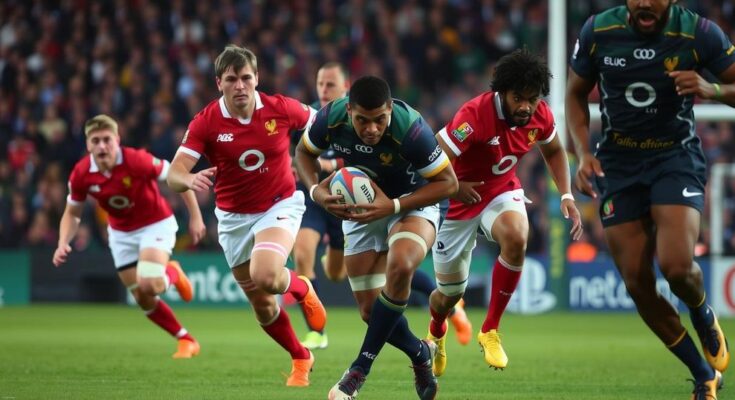South African rugby, after recent successes in World Cups and the URC, faces significant challenges in the Champions Cup with only one win in six matches. Logistical difficulties impede team performance as they travel to Europe, leading to weaker lineups. There is a pressing need for structural changes in the tournament to better accommodate South African teams, which are crucial for both competitive integrity and the broader rugby landscape.
In recent years, South African rugby has experienced significant milestones, particularly under Rassie Erasmus’s leadership during their back-to-back World Cup victories. This was complemented by a successful transition from Super Rugby to the United Rugby Championship (URC), culminating in an all-South African final between the Bulls and Stormers in the 2021-22 season. However, the current trajectory of South African teams in the Champions Cup has raised concerns as they have secured only one victory from their first six encounters, indicating a troubling decline in performance.
The recently concluded matches reflected logistical challenges faced by South African franchises, such as the Sharks and Stormers, when traveling internationally. Both teams were compelled to field weakened lineups due to the strenuous travel demands. As Hurricanes coach John Dobson articulated, it is crucial for South Africa to improve its competitiveness in the Investec Champions Cup to merit their participation in high-level tournaments.
Despite these setbacks, there is optimism among South African officials regarding their value to European rugby. Former Welsh international Dan Biggar acknowledged the significant contributions of South African teams, enhancing competitiveness and raising television revenues in the northern hemisphere’s leagues. Nevertheless, practical solutions need to be implemented, such as structuring the tournament to allow South African teams to undertake mini-tours, which can better accommodate travel logistics and player performance.
Concerns also extend beyond logistics to the cultural and political dynamics of European rugby. Commentary from figures such as former hooker Brian Moore suggests that there may be resistance against South African teams competing internationally. This adds pressure on South African rugby to continuously justify their inclusion and success in the Champions Cup, especially as they strive for a long-term partnership not only in domestic competitions but also on an international scale, including aspirations for entry into the Six Nations.
The recent performances of South African teams, particularly the Bulls’ loss to Northampton and the Sharks’ significant defeat to Leicester, reveal the urgency for reform in how they engage in European competitions. Head coach John Plumtree’s remarks underscore the need to prioritize athlete welfare alongside competitive integrity. Given the present challenges, there is a clear imperative for South African rugby to navigate these turbulent waters carefully to secure a commendable position on both local and global stages.
The topic addresses the current challenges faced by South African rugby in European competitions, especially in the Champions Cup. Following successful World Cups and participation in the URC, South African teams are now struggling to maintain competitive performance against northern hemisphere franchises. The logistics of travel and differences in competition levels have raised concerns about their long-term viability and impact within European tournaments. The discussion includes insights from players and coaches highlighting the need for systemic adjustments to improve participation conditions for South African teams in international settings.
In summary, South African rugby is at a critical juncture, facing substantial challenges in the Champions Cup as they adapt to international competition. While the contributions of these teams to European rugby are valued, practical resolutions to travel logistics and competitive formats must be addressed. The advocacy for restructuring approaches and improving athlete welfare is paramount for sustaining South Africa’s relevance and success on the international rugby stage. Continued dialogue among stakeholders will be necessary to foster a supportive environment for South African teams.
Original Source: rugby365.com




